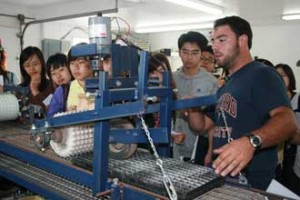
By Jim Hynes
For the second consecutive year, a group of Chinese agriculture students spent a month at Macdonald Campus learning first hand about agriculture in Canada.
For four weeks in July and August, 17 undergraduate students from the South China Agricultural University took an intensive general course about agriculture in Canada taught by Plant Science professor Caroline Begg. The students lived in Laird Hall, where they used cooking equipment provided by McGill to prepare their meals. They were supported during their stay by McGill Research Associate Dr. Huilan Chen, who served as a mentor.
“Agriculture and Agri-Food Canada, in collaboration with all the agricultural faculties of Canadian universities, is encouraging these kinds of collaborations between Chinese and Canadian colleges and universities,” said Prof. Suha Jabaji, Associate Dean, Research and Graduate Education at the Faculty of Agricultural and Environmental Sciences, who established and developed the exchange program last year. “At the same time, and I have spent a lot of time in China, I can tell you that the Chinese are very interested in programs like these. These programs benefit both countries with respect to training and recruitment of the best undergraduate Chinese students to come to McGill. This might just be the beginning of something bigger, possibly with post-grad students,” she said. A student from last year’s program has started her graduate work in the Faculty.
The visiting students attended Begg’s class, which featured lectures by various professors from the Macdonald Campus on topical issues concerning the Canadian food and agricultural system, and also took part in field and lab work. At the end of the course, the students had to deliver both a written report and on oral presentation on their internship work in the Faculty. Begg said the quality of the students’ work, which was submitted in English, was impressive.
“Their English is pretty good. And the written material is very good. They’ve been able to communicate. They had many questions for the producers they visited and also for the staff members who gave lectures.”
Indeed, what stood out most, Begg said, was their passion for agriculture and their curiosity for discovering new things about it, some of which surprised them.
“Their university in China is very similar to ours here, so many of their concerns are the same,” Caroline Begg said. “They study many of the same things we do. And there is a strong similarity in the kind of agriculture they practice and ours in Canada. Of course there are differences as well. They are more or less in a tropical area and the idea of agriculture that basically ends in the fall was very new to them. That was a hard thing for them to understand, that we just don’t grow anything outside in the wintertime.”
The students visited a number of agricultural enterprises during their stay, including some small ones using new techniques and following new trends, like community-supported agriculture and urban agriculture. They also visited large commercial operations using a lot of technology and machinery, something that is completely different from most Chinese agriculture, Begg said.
“Hopefully they leave here with an understanding of both the differences and similarities in agriculture between here in Canada and where they live. What I had them do with their assignments is contrast and compare,” Begg said. “And many of them see that there are strong similarities because agriculture is important to both countries. Of course they saw the differences too, like the fact that we’ve introduced a very strong tracking system in food safety, something that China is now seriously looking at. In the end I think we were able to show them that many of the issues that are of concern to people in China are important to Canadians too.”
